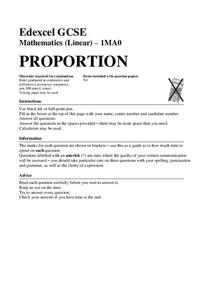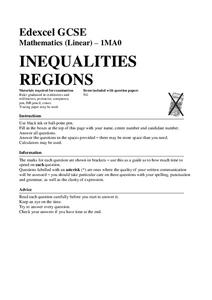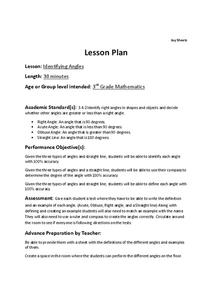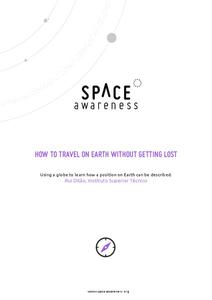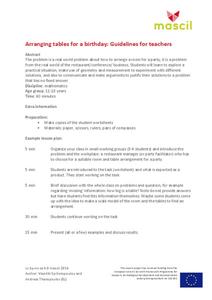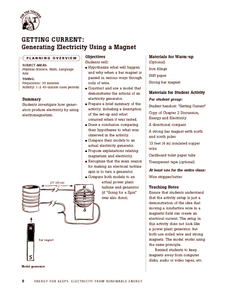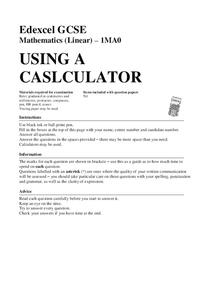EngageNY
Properties of Dilations
Investigate dilations to learn more about them. The second segment in a series of 16 provides a discussion of properties of dilations by going through examples. The problem set provides opportunities for scholars to construct dilations.
Corbett Maths
Loci Part 1
Where can it go? The first video on loci develops a definition and provides some quick sketches of the loci of all points with given characteristics. The presenter does an example of the loci of points a given distance from an L shape.
EngageNY
Construct an Equilateral Triangle (part 1)
Drawing circles isn't the only thing compasses are good for. In this first installment of a 36-part series, high schoolers learn how to draw equilateral triangles by investigating real-world situations, such as finding the location of a...
Mathed Up!
Powers, Roots, and BIDMAS
Reinforce math skills with an eight-page exercise that stretches scholars' computation muscles through 13 order of operation problems.
Mathed Up!
Ratio
Reinforce math skills with an eight-page exercise comprised of 15 problems covering the concept of ratios.
Mathed Up!
Ratio
Practice makes proficient! Here, scholars practice their ratio skills to convert measurements while cooking. Nine problems make up a nine-page document equipped with clear instructions and advice for successful completion while working...
Mathed Up!
Solving Quadratics by Factorising
Young mathematicians view a video on solving quadratic equations by factoring. They use this skill to complete a worksheet of practice problems — a great way to gauge understanding!
Mathed Up!
Inequalities Regions
Discover how to solve systems of inequalities by graphing. An informative video shows pupils how to determine the solution set after graphing each inequality of a system. To finish, a worksheet gives them a chance to practice this skill.
Mathed Up!
Fractional and Negative Indices
Explore how to deal with fractional and negative exponents. Scholars watch a video reviewing fractional, zero, and negative exponents. After the video, they test their skills by completing a instructional activity covering the concepts.
Mathed Up!
Upper and Lower Bounds
Investigate how rounding affects values. Individuals watch a video about how to find the highest and lowest possible numbers that result in a given value when rounded to a certain place value. They finish by completing a worksheet of...
Mathed Up!
Circle Theorems
Explore theorems involving circles. Individuals watch a video that reviews the basic parts of a circle. They learn about circle theorems and compete a worksheet of problems that use these theorems — putting their skills to work right away!
Curated OER
Mapping with a Compass: A Simulated Survey
Students use compasses and grids to map the locations of artifacts found in a simulated dig site. In groups, they role-play as future archeologists excavating a school site. Groups begin at their assigned datum and site the artifacts...
Curated OER
TE Activity: Northward Ho!
Students design a simple compass. They examine how the Earth's magnetic field has both horizontal and vertical components. They determine how a compass works and work with cardinal directions.
Curated OER
Blazing the Trail
Learning about proportions through measuring and mapping distances is the focus of this real-world math instructional activity that doubles as an activity. Mathematicians complete a course designed to measure and map locations in order...
Curated OER
Identifying Angles
Third graders analyze angles and determine if they are acute, right, or obtuse. In this angles activity, 3rd graders study the definition and characteristics of each angle. Students then do a worksheet to identify the name of the angle.
Space Awareness
How To Travel On Earth Without Getting Lost
Have you ever wanted to travel the world? Take a virtual trip with a geography lesson plan that uses longitude and latitude, the position of the sun, an astronomy app, and a classroom globe.
Virginia Department of Education
Congruent Triangles
Is this enough to show the two triangles are congruent? Small groups work through different combinations of constructing triangles from congruent parts to determine which combinations create only congruent triangles. Participants use the...
Curated OER
All About the Animals
Whose footprints are those? After reading Janet Halfmann's book, Little Skink's Tail, young scholars use footprints to determine where on a gridded map certain animals have been spotted. They use the map to answer 3 questions, one...
Mascil Project
Arranging Tables for a Birthday
Planning a party of 45 guests may be more complicated than it would seem. Learners must design the space in accordance with these constraints about the space available in the room. They need to calculate area, circumference, and linear...
Energy for Keeps
Getting Current: Generating Electricity Using a Magnet
Give your class a magnetic charge with this creative experiment designed to teach emerging scientists about electromagnetism. Pupils construct a model that demonstrates the function of an electrical generator and test this creation in a...
Mathed Up!
Angles
What does a geometric farmer drive? A protractor, of course! A set of assessment worksheets prompts learners to use a protractor as they measure angles, name angles, and identify lines. Use the video as a way to introduce the concepts.
Mathed Up!
Using a Calculator
Here's a video that presents several numerical expressions to be evaluated using a calculator.Viewers come to realize that sometimes it is not just a matter of punching in the numbers, but they also need to be concerned about how the...
Mathed Up!
Pie Charts
Representing data is as easy as pie. Class members construct pie charts given a frequency table. Individuals then determine the size of the angles needed for each sector and interpret the size of sectors within the context of frequency....
Curated OER
Measure: Bearings and Scale Drawings
Pupils practice drawing geometric figures. In this geometry lesson, learners complete an activity that requires them to draw angles and shapes to the nearest degree.







